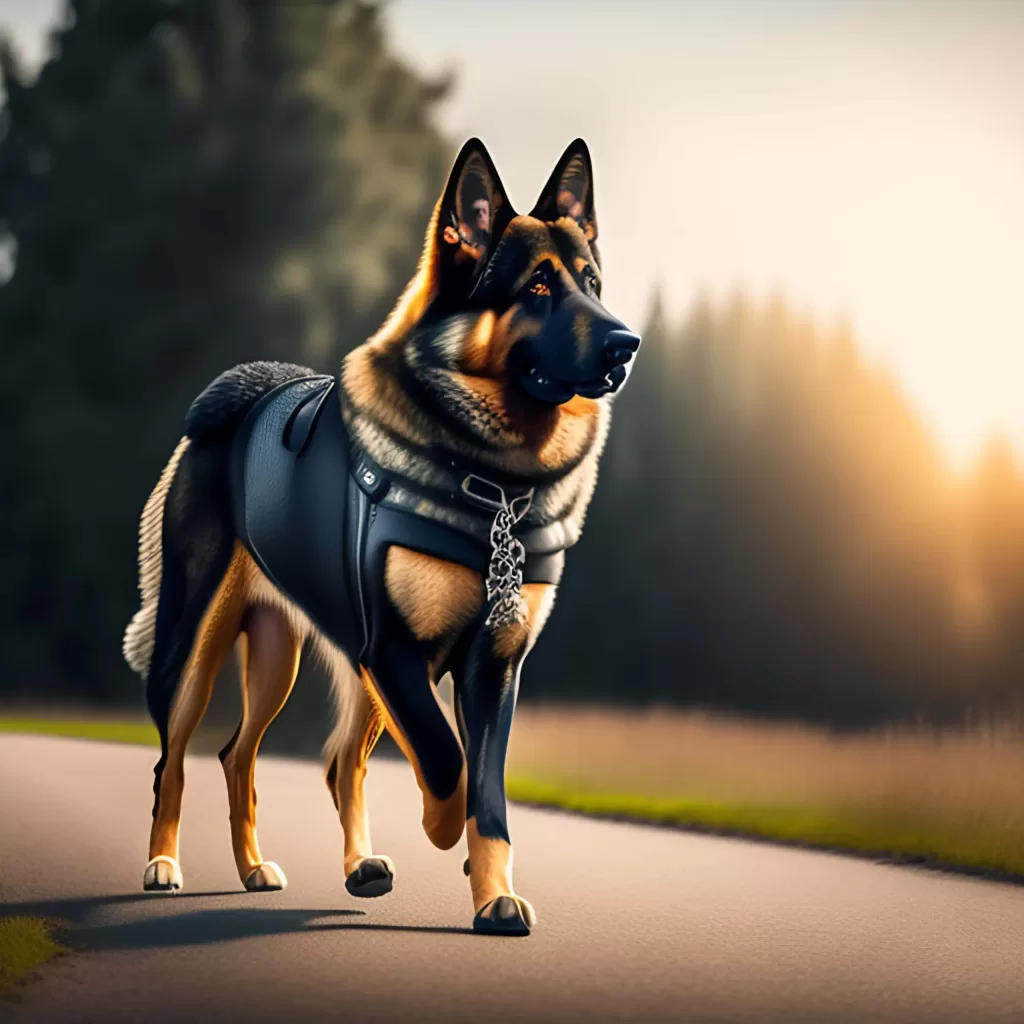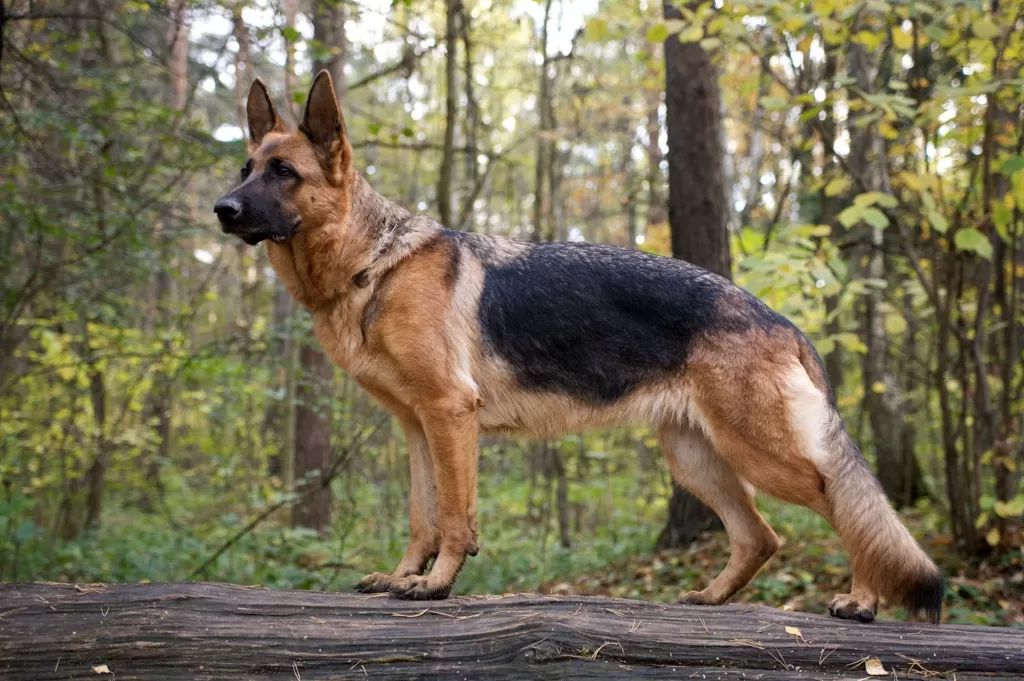German shepherd Lifespan? Curious about the wonderful journey you’ll share with your German Shepherd? Let’s start with the facts: the average lifespan of a German Shepherd ranges between 9 to 13 years. But buckle up, because this blog holds more than just numbers.
Table of Contents
We’re delving into the factors that influence their lifespan, essential tips for their care, and how you can make every moment count. If you’re as eager as your pup waiting for a treat, then this is the read you’ve been wagging your tail for!”
Growth spurts will occur in the breed when they are 12 to 18 months old, meaning that they could reach 4 feet at the shoulder and weigh 90 pounds at maturity.
Male German Shepherds weigh an average of 90 pounds and stand 24 to 26 inches tall. Females weigh an average of 75 pounds and stand 23 to 25 inches tall.
The German Shepherd breed comes in many colors and maybe black and tan (which is what the AKC standard calls for), red, or white.
Many German Shepherds will have masks over their faces and may even have “saddle” markings on their backs.
How Long Do German Shepherds Live?
So, how long do German Shepherds live for?

There are many sources of information about German Shepherd lifespans available, but it can be difficult to know who to trust.
Most websites cite an average life expectancy of between 10 to 14 years.
However, according to a recent study by a team of animal scientists at the University of Georgia, the average life span for a German Shepherd is actually closer to 9 to 12 years.
The reason for this disparity in the reported lifespan of the German shepherd seems to be largely down to differences in living conditions.
What is the Average Life Expectancy of a German Shepherd?
| Age | Male | Female |
|---|---|---|
| Median lifespan | 9.7 years | 11.1 years |
| Maximum lifespan | 15 years | 16 years |
The life expectancy of a German shepherd is relatively long.
In fact, they can live more than ten years if they are kept healthy and happy, according to the American Kennel Club.
The average German shepherd’s Lifespan is about 10 to 13 years.
There are some factors that can affect a German shepherd’s lifespan, such as obesity and lack of exercise.
Being a dog that likes to hunt, herd, and guard, it is important for a German shepherd to have a lot of exercise and human interaction.
Also Read: Avoid early morning walks with your German shepherd in winter
If the dog also has an owner who is physically inactive, this will keep the dog from gaining weight, which can shorten its lifespan.
Here are some additional things to keep in mind about German Shepherd lifespan:
- Female German Shepherds tend to live longer than male German Shepherds.
- German Shepherds who are bred from healthy parents and who receive good care are more likely to live longer.
- German Shepherds who are prone to certain health conditions, such as hip dysplasia or elbow dysplasia, may have a shorter lifespan.
Factors Affecting German Shepherd Lifespan
| Factor | Observation |
|---|---|
| Genetics | German Shepherds who are bred from healthy parents and who do not have any inherited health conditions are more likely to live longer. |
| Diet | A high-quality diet that is appropriate for your German Shepherd’s age and activity level can help them live a longer and healthier life. |
| Exercise | German Shepherds need plenty of exercise to stay healthy and fit. Regular exercise can help them maintain a healthy weight and reduce their risk of developing health problems. |
| Weight | German Shepherds who are overweight or obese are more likely to develop health problems, such as heart disease, diabetes, and arthritis. Keeping your German Shepherd at a healthy weight can help them live longer. |
| Vaccinations | Keeping your German Shepherd up-to-date on their vaccinations can help protect them from serious diseases, such as rabies and distemper. |
| Regular Vet Care | Regular vet checkups can help detect and treat health problems early, which can improve your German Shepherd’s lifespan. |
| Stress | Stress can weaken the immune system and make German Shepherds more susceptible to illness. It is important to provide your German Shepherd with a calm and loving environment to help them stay healthy. |
| Injuries | Injuries can lead to infection and other health problems. It is important to take your German Shepherd to the vet if they are injured, even if the injury seems minor. |
Mobility issues like hip dysplasia, Broken leg, arthritis, and spinal problems are some of the big factors affecting German Shepherd life expectancy.
Mobility issues do not directly kill the dog, but the deteriorating quality of life they cause can lead owners to change their euthanasia to protect their pets from pain.
Other factors affecting German shepherd lifespan
- Flatulence – a condition in which the stomach is filled with air and turns on its axis, stopping the blood supply to the intestines. It is fatal in almost half of all cases.
- Degenerative Myelopathy – Degenerative spinal disease without any treatment can eventually lead to paralysis.
- Hip Dysplasia – A painful condition in which the femur does not fit properly in the hip socket. Often leads to arthritis and mobility problems.
- Epilepsy – Although treatable up to a point, seizures can eventually be fatal.
The Ingredients for a Long and Joyful Journey
Imagine your German shepherd Lifespan as a recipe that requires just the right ingredients to be truly fulfilling. Providing a balanced and nutritious diet is like the flour in the mix, giving them the energy and vitality to tackle each day with enthusiasm. Regular exercise, the eggs of our metaphorical recipe, keeps their bodies and minds active, preventing boredom and promoting overall well-being.
Storytime: Meet Max, a sprightly German Shepherd who lived to be 15 years old. Max’s owner, Sarah, believes his longevity was due to their daily adventures in the nearby park. Rain or shine, they would embark on explorations, meeting new friends and keeping Max’s spirit young.

As the story goes, just like too much salt can spoil a recipe, neglecting regular veterinary check-ups can take a toll on your pup’s health. These check-ups, akin to the seasoning in our concoction, catch any issues early on, allowing for timely interventions that can extend your German shepherd Lifespan.
There is no way to guarantee that your German Shepherd will live a long, healthy life, but there are many ways to increase your chances of spending many good years with your furry children.
Regular vet care
You should take your German Shepherd to the vet at least once a year when they are young and twice a year when they are young for wellness inspections. Why?
It is much easier to treat if your dog has caught many health conditions in advance before they show symptoms.
In addition, dogs hide their pain, so you may catch something like your wet hip dysplasia before you see your German Shepherd limping.
German Shepherd Weight Management
| Age | Ideal Weight | Best Food | Other Supplements |
|---|---|---|---|
| 1 month | 5-9 pounds | High-quality puppy food that is specifically designed for large breed puppies, such as Royal Canin German Shepherd Puppy Formula, Purina Pro Plan Large Breed Puppy Formula, or Eukanuba Large Breed Puppy Formula | None |
| 2 months | 10-15 pounds | High-quality puppy food that is specifically designed for large-breed puppies | Omega-3 fatty acids |
| 3 months | 15-20 pounds | High-quality puppy food that is specifically designed for large-breed puppies | Joint supplements |
| 4 months | 20-25 pounds | High-quality puppy food that is specifically designed for large-breed puppies | Probiotics |
| 5 months | 25-30 pounds | High-quality puppy food that is specifically designed for large-breed puppies | Multivitamins |
| 6 months | 30-35 pounds | High-quality adult food that is specifically designed for large breed dogs, such as Taste of the Wild High Prairie Large Breed Adult Formula, Blue Buffalo Wilderness Large Breed Adult Chicken Recipe, or Orijen Large Breed Dry Dog Food | Omega-3 fatty acids |
| 7 months | 35-40 pounds | High-quality adult food that is specifically designed for large-breed dogs | Joint supplements |
| 8 months | 40-45 pounds | High-quality adult food that is specifically designed for large-breed dogs | Probiotics |
| 9 months | 45-50 pounds | High-quality adult food that is specifically designed for large-breed dogs | Multivitamins |
| 1 year | 50-60 pounds | High-quality adult food that is specifically designed for large-breed dogs | Omega-3 fatty acids, joint supplements, probiotics, and multivitamins |
| 1.5 years | 60-65 pounds | High-quality adult food that is specifically designed for large-breed dogs | Omega-3 fatty acids, joint supplements, probiotics, and multivitamins |
| 2 years | 65-70 pounds | High-quality adult food that is specifically designed for large breed dogs | Omega-3 fatty acids, joint supplements, probiotics, and multivitamins |
| 3 years | 70-75 pounds | High-quality adult food that is specifically designed for large-breed dogs | Omega-3 fatty acids, joint supplements, probiotics, and multivitamins |
| 4 years | 75-80 pounds | High-quality adult food that is specifically designed for large-breed dogs | Omega-3 fatty acids, joint supplements, probiotics, and multivitamins |
| 5 years | 80-85 pounds | High-quality adult food that is specifically designed for large-breed dogs | Omega-3 fatty acids, joint supplements, probiotics, and multivitamins |
More than half of all pet dogs are overweight or obese, and dogs are just as obese as humans.
In addition, any unwanted weight can put more stress on already sore joints in dogs prone to hip dysplasia or arthritis.
How can you tell if your German Shepherd is overweight? When viewed from the side or above while standing, they should be tucked into the waistline. You can even feel (but not see) the ribs of your German Shepherd.
Making sure your dog has a full and balanced diet is tricky when reducing their diet, so if your GSD is overweight, talk to your vet about the best way to help you lose weight safely.
Find a Good breeder to Get a Healthy Puppy
Since the German Shepherd is a very popular breed, many breeders are looking to make money through dog breeding and are not interested in improving the breed.
A dog that is raised just for looks or money is more likely to suffer from genetic problems such as hip dysplasia or degenerative myelopathy than German Shepherds to work and stay as healthy as possible.
Since GSDs from American lines may have a shorter lifespan than German lines, it may be worthwhile to look for well-known breeders who have added German dogs to their breeding programs to help strengthen the breed and reduce the likelihood of genetic problems.
Feed high-quality food
Although most commercial dog foods are labeled “nutritionally complete” it does not make them healthy. Most dog foods contain supplements such as corn or meat by-products that are low in nutrients. It makes cheap dog food the equivalent of human junk food.
Just as eating healthy can help humans live longer, high-quality dog food can help your German Shepherd live longer, healthier lives.
How do you know if your dog’s food is of high quality? Here are some tips:
It should not contain corn, animal by-products or artificial colors, flavors, or preservatives.
Meat should be the first ingredient. For the first ingredient, meat is better than real meat, but the meal is even less on the list.
Supplements for Better Life
Because German Shepherds are prone to painful joint problems, you should start them at an early age with a joint supplement containing glucosamine and chondroitin, which can help prevent and reduce joint pain.
If you want to know more about joint supplements, we will cover them in more depth and provide our recommendations here.
Another good supplement to consider for your German Shepherd is fish oil. Some conditions that can help improve fish oil are:
- Inflammation of the intestines
- Spinal problems
- Hip or elbow dysplasia
- High cholesterol
- High blood pressure
- Arthritis
- Itchy skin or dry coat
Give your German Shepherd plenty of exercise
Every dog needs exercise to prevent obesity and to keep them in shape, but German Shepherds have excess energy levels and can switch to destructive behaviors if they do not get enough exercise.
The bored German Shepherd can easily eat inedible items when alone and if they swallow something that does not go through their digestive system, it will kill them, so exercise can really directly affect their lifespan.
German Shepherds need at least an hour of exercise every day and the more the better. They are raised to work all day, so a 30-minute walk twice a day may not be enough to expend their energy.
Teach them and engage them in something new
It is a myth that you cannot teach an old dog new tricks. This may be the right time to teach them some new tricks.
It helps keep their brain engaged- we all need it as we progress into our old age. Whether you want to teach your German Shepherd how to shake or refresh him with some of the tricks he knows as a little dog, reward your progress and effort by teaching your dog sometime each day.
Take care of your dog’s needs
It is important not to neglect your big dog as they will have more content to lie down and sleep on their dog bed. Especially if you have other dogs that seem to need more attention and have more energy, you can start ignoring your old German Shepherds. Do it!
Even if your dog is more than ten years old, they still need your attention and approval. Make sure they are given the same love and respect from new puppies to old-age dogs.
The Final Chapter: Cherishing Their Legacy
Just like any cherished tale, the German Shepherd’s journey eventually comes to an end. But what they leave behind is a legacy of loyalty, love, and cherished memories. Their pawprints may fade from the floor, but they remain etched in your heart forever.
In conclusion, the German Shepherd’s lifespan is a blend of genetics, care, and the joy you infuse into their days. So, as you continue your shared adventure, remember to make every moment count. From those first days of puppyhood to the graceful years of seniority, your furry companion’s lifespan is a story waiting to be told—one filled with the magic of companionship, wagging tails, and a love that transcends time.
Embrace this chapter, and let your German Shepherd’s tale become a part of your own.

